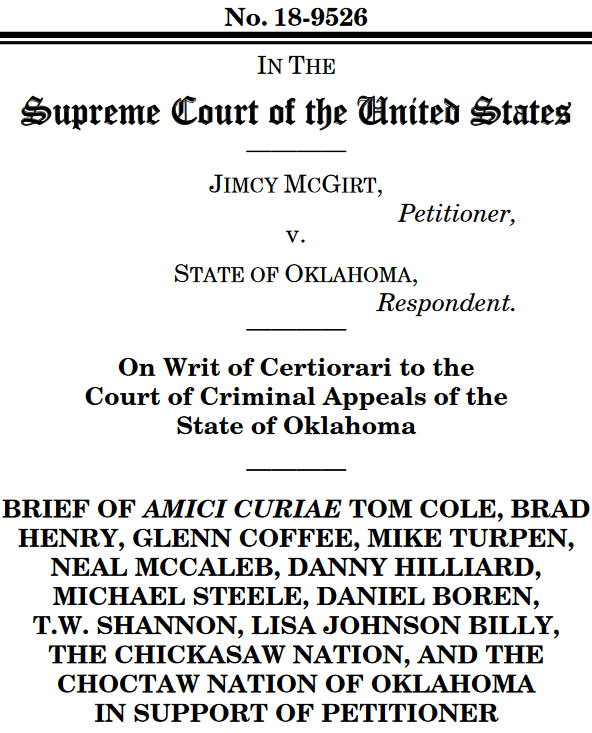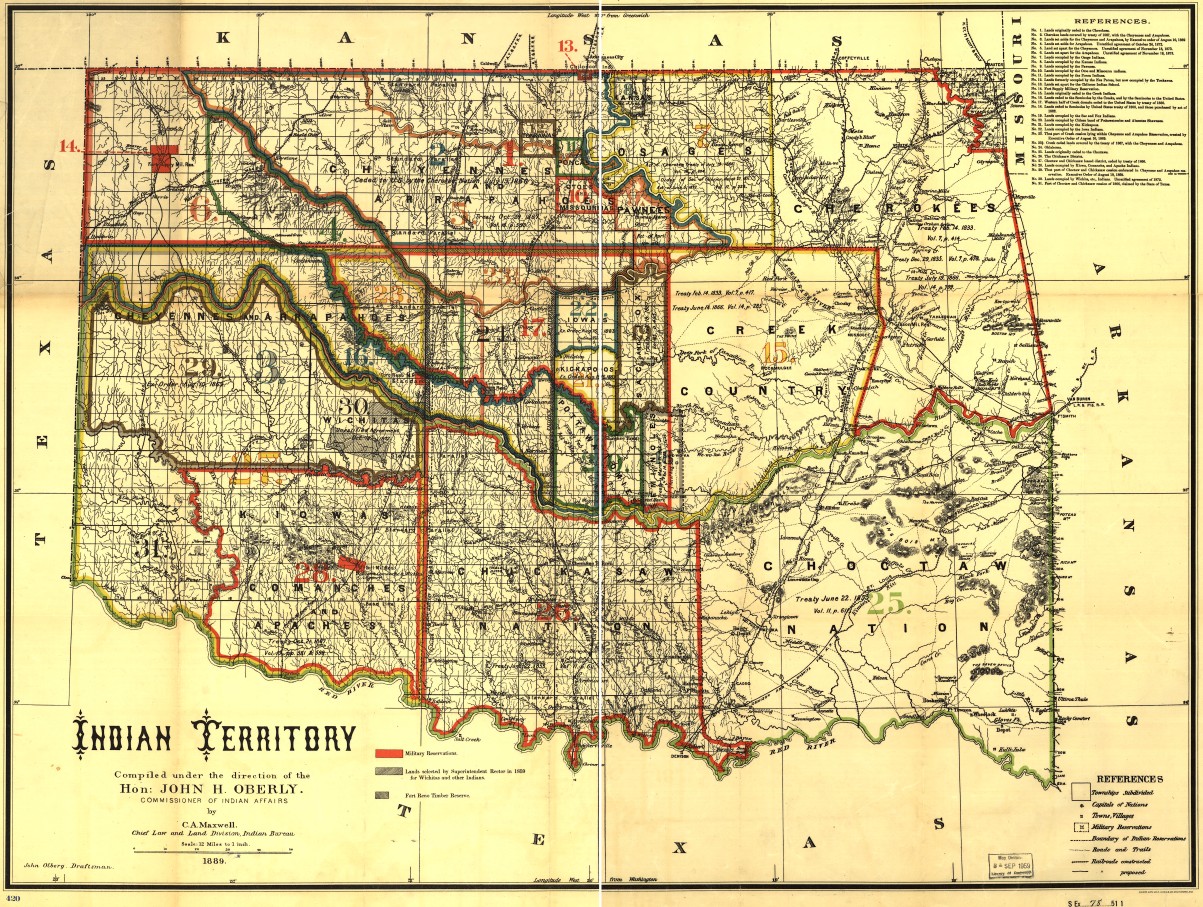2022: The McGirt election
During the recent U. S. Senate debate on KOTV/KWTV, there wasn't much distance between the four participating candidates on economic matters and social issues. There were a few differences on how the U. S. should respond to the Russian invasion of Ukraine and the wisdom of unrestricted aid to the Ukrainian government. Conservatives would find any of the candidates would be preferable to unopposed Democrat nominee Kendra Horn and losing the chance to regain Republican control of the Senate.
There were major differences on what is the most consequential issue for Oklahomans in this election: The response to the U. S. Supreme Court's decision in McGirt v. Oklahoma, the Court's 5-4 declaration, contrary to over a century of settled law, that the Creek "Reservation" was never disestablished and still exists for the purposes of the Federal Major Crimes Act, and therefore a child molester's conviction in state court was invalid. Whether it would serve as a precedent affecting land title, regulation, oil and gas exploration, and taxation is a matter that Justice Neil Gorsuch, writing for the majority, chose to leave unresolved for future litigation.
The implications of a ruling in favor of tribal government territorial sovereignty were serious enough to prompt amicus briefs supporting the State of Oklahoma from the City of Tulsa, the Federal Government, the National Sheriff Association, and several states.
The situation directly created by Gorsuch's McGirt opinion is bad enough: Eastern Oklahoma crime victims who are tribal citizens and non-tribal citizens who are victimized by tribal-citizen criminals must look to a Biden-appointed U. S. Attorney and overcrowded federal courts (and Clinton/Obama/Biden federal judges) for justice, rather than the district attorneys and district judges that are directly accountable to Oklahoma voters.
Candidate Alex Gray, National Security Council chief of staff in the Trump administration, was not invited to the debate, but he has been prominent in calling for the most straightforward solution: Congress must act formally to disestablish the reservations that no one believed or claimed existed until a few years ago. This will not happen, however, unless Oklahoma senators and congressmen lead the way. It is therefore crucial for Oklahoma voters to choose candidates at every level who will actively work for disestablishment of reservations.
Nathan Dahm and Scott Pruitt spoke strongly in favor of disestablishment in the debate. Pruitt called the McGirt decision "an existential threat to the sovereignty of the state of Oklahoma," and said, "Congress has every right and every authority to disestablish reservations in the State of Oklahoma and restore the sovereign boundaries of Oklahoma." Dahm noted the verbal sleight of hand used by Gorsuch to "create" a reservation that Gorsuch admitted was never formally established. Dahm committed to introducing legislation to disestablish reservations in Oklahoma.
(The question was discussed in the KOTV/KWTV debate beginning at about 25:30.)
Luke Holland, Jim Inhofe's former chief of staff, wants to let all those pending cases based on the McGirt precedent work their way through the Federal courts and after that have the state and the Federal government and the tribal governments negotiate a crazy quilt of compacts and agreements to deal with the problems that the court rulings create.
T. W. Shannon, a citizen of the Chickasaw Nation and CEO of the bank owned by the Chickasaw Nation government, tried to minimize the impact of the McGirt ruling, as if the court's manufacture of a reservation would have no impact on other cases. He spoke against any federal action on the matter, attempting to frighten voters that Nancy Pelosi and Chuck Schumer would be in control of Oklahoma's destiny. That's strange thing to say, considering that he's running for Senate in hopes of being part of an expected Republican majority in both houses of Congress with Republican leaders replacing Pelosi as Speaker of the House and Schumer as Senate Majority Leader.
Later in the debate (about 37 minutes in), Shannon was asked about the amicus curiae brief he signed in support of child molester McGirt. In reply, Shannon claimed that McGirt "is now doing more time and serving a longer sentence" after being convicted in Federal court. Shannon's answer is misleading: McGirt's sentence in state court was 500 years; now he's serving life without parole. Either way, McGirt would have spent the remainder of his life in prison, but Shannon's way was to require McGirt's victim, now an adult, to relive the abuse she suffered at Jimcy McGirt's hands so that he could be convicted a second time.

Congressman Markwayne Mullin, a citizen of the Cherokee Nation, skipped the debate, but a statement Mullin made jointly with four tribal governments when the ruling was announced makes clear where he stands, with the "sovereign nations" and against Oklahoma citizens who need legal clarity and stability.
Indeed, any candidate that talks about the importance of respecting the "sovereign nations" (which went out of the sovereignty business after negotiating the sale of their territory in the run-up to statehood) has already demonstrated that he or she isn't going to be working assertively to protect the rights of ordinary Oklahomans.
The quarrel here is not with the hundreds of thousands of Oklahomans who also have citizenship in a tribe and enjoy the benefits that citizenship confers. The argument is with the tribal government leaders who have suddenly become much more important despite the tiny numbers of voters involved in electing them. In a recent column, OCPA President Jonathan Small wrote:
David Hill was elected Muscogee principal chief with 3,399 votes. Kevin Stitt was elected Oklahoma governor with 644,579 votes....Few Cherokees are directly involved in tribal government. The tribe reports over 400,000 individuals are Cherokee citizens, but less than 14,000 voted in the last election for tribal chief. (Similar trends are also notable for the Muscogee Nation, which claims 86,100 citizens.)
Tribal governments, despite the low level of voter accountability, were already gaining influence and power thanks to tribal gambling revenues and special carveouts for tribally owned businesses. Now that court rulings may give them control over land use regulation and oil and gas exploration in half of the state, expect tribal governments to become favor factories, as businesses go through tribal officials to get the favors they want if the decisions of city or state authorities don't go their way.
Pro-abortion forces are already discussing ways to subvert the expected ruling overturning Roe v. Wade, such as a Biden executive order to make military bases sanctuaries for legal abortion, regardless of the laws of the state where a base is located. It's not a stretch to imagine a tribal government being financially induced by Planned Parenthood and abortionists to allow killing centers to open under tribal protection, even if it ran counter to the moral convictions of their tribal citizens.
In that same column, Jonathan Small commented on Cherokee Principal Chief Chuck Hoskin Jr's executive order to ban the Oklahoma flag from flying over Cherokee property. The chief quickly reversed course when a majority of the response from Cherokee citizens opposed the band.
If reservations remain established in SCOTUS's view and courts build on the McGirt precedent, these officials will have substantial and growing control over the everyday lives of Oklahomans, but only a small percentage of Oklahomans will have any say in their election. People can come to Oklahoma from Burma and Cuba and Ghana and Iraq and, in due time, follow the process to become citizens of Oklahoma and the U. S. A. with full rights. But even though my children were born here in Tulsa and have lived here their whole lives, because they don't have the right ancestry, they can never, ever be accepted as citizens of the Muscogee Nation. When South Africa allowed only a small minority ethnic group to participate in the democratic process, there was a global outcry and decades of pressure to overthrow that apartheid regime. We recognize the injustice of the situation in wealthy oil sheikdoms where the vast majority of residents are guest workers with no rights and no say in who rules them and how. Why would we want to replicate those injustices here?
The historical record makes it clear that Congress was intent on fully integrating Indian Territory and its residents into the United States of America as full citizens of a state like all the others. Tribal citizens in Indian Territory were granted U. S. citizenship in 1901. The U. S. reached negotiated settlements with each of the tribes to allot communal lands to individual Indians and to distribute the proceeds of the sale of any surplus lands for the benefit of tribal members. As of 1907, tribal governments no longer had any territory to govern.
The uncertainty and lack of accountability generated by the McGirt ruling is a problem for all Oklahomans, tribal citizens or not. At the 2022 primary, Oklahomans need to reject candidates who want to play footsie with tribal governments and elect candidates who will restore Oklahoma's sovereignty and protect the rights of all Oklahomans, not just the minority with special ancestry.
0 TrackBacks
Listed below are links to blogs that reference this entry: 2022: The McGirt election.
TrackBack URL for this entry: https://www.batesline.com/cgi-bin/mt/mt-tb.cgi/8953
